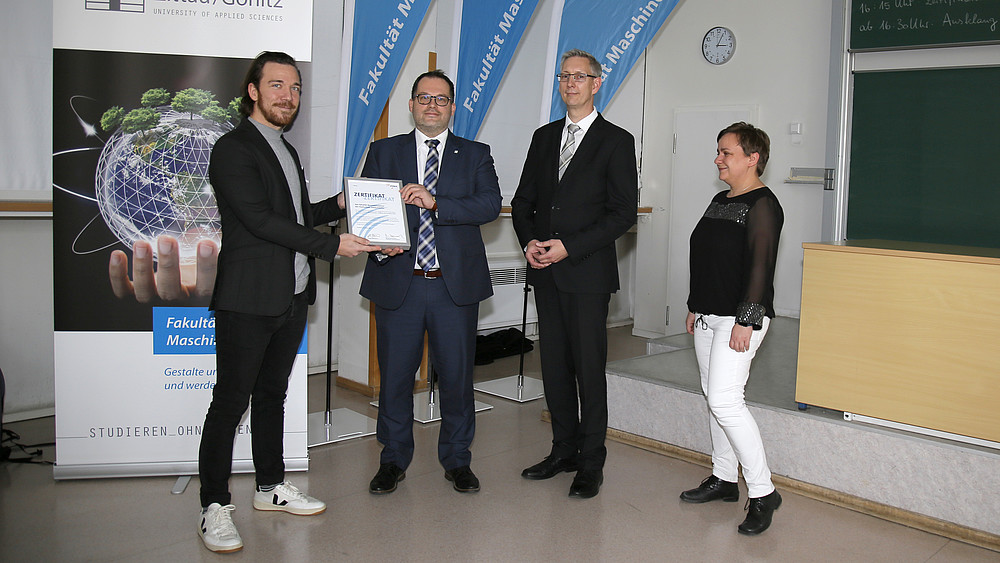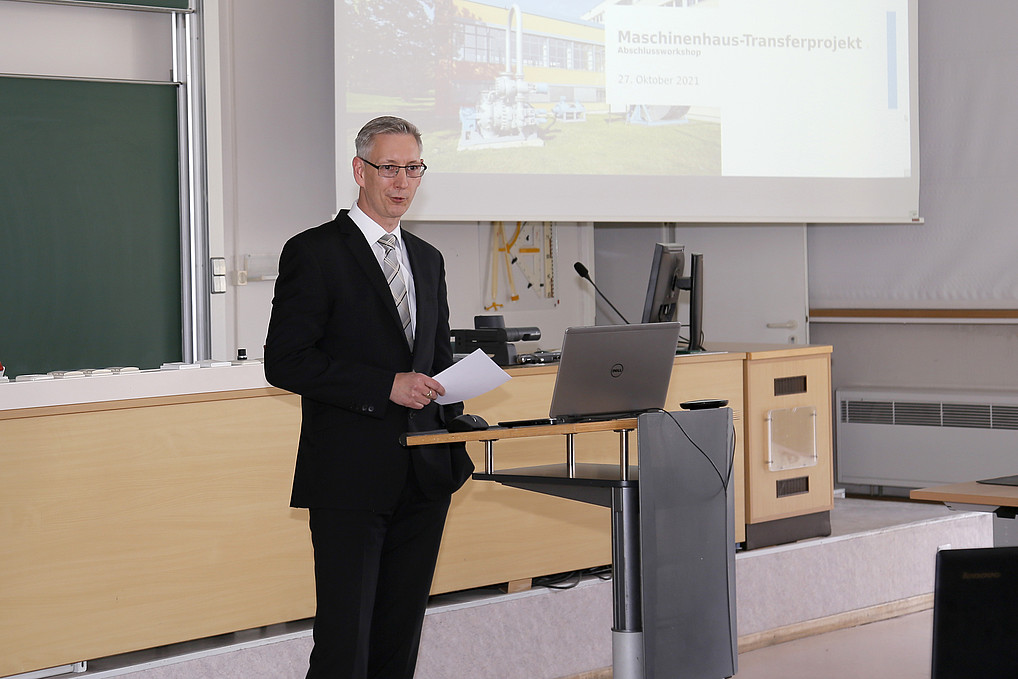The mechanical engineering course at the HSZG successfully completes the machine house transfer project in cooperation with the VDMA.

The implementation of teaching objects to accompany studies, an e-learning tool in the Technical Thermodynamics module and a concept "Young skilled workers for mechanical engineering in structural change " - these and other results were presented by the Faculty of Mechanical Engineering and the German Engineering Federation (VDMA) at the final workshop of the Maschinenhaus transfer project. The aim of the VDMA's Maschinenhaus initiative is to increase student success in the engineering sciences and to advise and support universities in their teaching.
How can student success be further increased? And how can the next generation of engineering specialists be secured? These were just two of the key questions that were discussed in several rounds of talks with course directors, lecturers, students and companies as part of the transfer project. The project at Zittau/Görlitz University of Applied Sciences was accompanied by experts from the VDMA and the HIS Institute for Higher Education Development (HIS-HE).
Uwe Krüger from HIS-HE sees a "major challenge for universities" in the fact that mechanical engineering degree courses must continue to offer young first-year students courses "that open up good career prospects in the long term." "And this against the backdrop of sometimes leaps and bounds in the further development of technical possibilities - keyword Industry 4.0 - as well as the progressive differentiation of business fields and job profiles," adds Michael Patrick Zeiner, project manager of the VDMA Maschinenhaus initiative.
Three core measures emerged from the project, the implementation of which has already begun. To support interdisciplinary thinking, the teaching method of cross-module teaching objects was adopted and an initial teaching object was installed, which is used as a model in various disciplines.
To support students in the sense of self-organized learning and to reflect on their own level of knowledge, an e-learning offer was further developed in a basic module. And last but not least, in order to provide the next generation of skilled workers, particularly in the region, and to ensure that graduates are professionally qualified, an action plan was developed in which the networking of the HSZG with companies, educational and research institutions and other key institutions such as the VDMA is further developed into a results-oriented collaboration.
Participation in the Maschinenhaus transfer project provided new impetus for the further development of our mechanical engineering course. We were able to use the experience of the project team to integrate new approaches. The certification will help to give prospective students the certainty that they will complete a high-quality mechanical engineering degree with excellent career prospects." Prof. Dr.-Ing. Bernd Bellair, Dean
”Michael Patrick Zeiner, project manager of the VDMA's Maschinenhaus initiative, praised the project results achieved in his speech at the final workshop: "The companies are looking for young professionals who have already started to work on exemplary tasks from professional practice with an increasing degree of personal responsibility for problem solving and results during their studies. I am therefore very pleased that Zittau is now making such courses possible with great commitment through teaching objects and e-learning courses, but also by making use of company contacts." As an award for the successful participation in a transfer project and in recognition of the commitment of the Faculty of Mechanical Engineering, he then presented the Zittau/Görlitz University of Applied Sciences with the VDMA "Machine House Certificate".
The Rector of Zittau/Görlitz University of Applied Sciences, Prof. Dr.-Ing. Alexander Kratzsch, emphasized the importance of the university as a STEM location in his welcoming address at the certificate presentation:
There is a great need for young and well-trained junior engineers both in the region and beyond. Zittau/Görlitz University of Applied Sciences is committed to its tradition as an energy technology and engineering university. The successfully completed participation in the Maschinenhaus transfer project has increased the prestige and attractiveness of Zittau/Görlitz University of Applied Sciences as a STEM study location."
”The mechanical engineering courses at the HSZG:
Bachelor's degree in Mechanical Engineering
Diplom degree course in Mechanical Engineering
Dual KIA (sandwich-style) degree course in Mechanical Engineering
Master's degree in Mechanical Engineering

With the Maschinenhaus initiative, the VDMA has been supporting faculties and departments of Electrical Engineering and Computer Science' in the further development of teaching and the achievement of greater academic success since 2013. The Maschinenhaus sees itself as a "platform for innovative teaching" that connects stakeholders from universities, politics and companies. The aim is to counteract the high drop-out rates in engineering degree courses and ensure high-quality engineering studies.
In currently 62 ongoing or already completed transfer projects throughout Germany, theory is put into practice and the status quo of teaching is analyzed and new measures designed in individual workshops. The Maschinenhaus initiative collects good practice examples of innovative university teaching that have already been successfully implemented in a toolbox. All further information on the Maschinenhaus initiative and the VDMA's commitment to universities can be found at vdma.org/ingenieurausbildung.